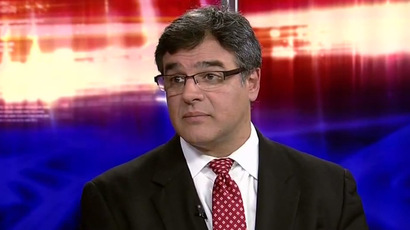End to privacy? Western firms hawk mass surveillance technology to developing world

Human rights groups are sounding alarms as Western firms sell mass surveillance technology in Africa, Asia and the Middle East, equipping governments and companies new capabilities to snoop on citizens.
Despite the public outcry over mass global surveillance being
carried out by the NSA and the GCHQ, brought to light in May by
US whistleblower Edward Snowden, the scandal has not prevented
tech companies and countries from closing contracts on spy
technology.
That was the conclusion by Privacy International, a surveillance
technology watchdog that has spent four years studying over 1,000
brochures and seminars used at technology fairs in major cities
around the world, including in Dubai, Prague, Brasilia, Kuala
Lumpur, Paris and London, the Guardian reported.
Researchers listed themselves as potential buyers to gain access
to the private conventions.
On the basis of its findings, the watchdog released the
Surveillance Industry Index, which shows how tech firms from
Germany, France, Israel, the UK and US offer governments a broad
array of systems that allow them to secretly monitor email and
phone communications.
The index provides details from 338 companies, including 77 from
the UK, offering governments around the world a total of 97
different types of technology to choose from.
One firm proudly touts its "massive passive monitoring"
equipment, which can "capture up to 1 billion intercepts a
day," the report says. Others sell cameras that can be
concealed in cola cans or children's car seats, while one firm
offers to transform vehicles into surveillance control centers.
Since the companies promote the new technology as a means to help
governments defeat terrorism and crime, there appears to be
nothing illegal about the services.
Meanwhile, despite the international scorn heaped on the United
States for collecting meta-data on millions of communications
around the world, as well as monitoring the phone calls of world
leaders, including German Chancellor Angela Merkel, this does not
seem to have a cooling effect on sales.
Indeed, there is no lack of demand for this ‘off the shelf’
equipment that will give more governments the power to spy on
emails, text messages and phone calls - capabilities that have
become associated with government agencies such as GCHQ (General
Communications Headquarters) and the NSA (National Security
Agency).
One Dubai-based tech company provides DIY system similar to
GCHQ's Tempora program, which hacks into fiber-optic cables to
retrieve private data.
Privacy International says manufacturers of surveillance
technology should be regulated just like arms manufacturers.
"There is a culture of impunity permeating across the private
surveillance market, given that there are no strict export
controls on the sale of this technology, as there are on the sale
of conventional weapons," Matthew Rice, research consultant
with Privacy International, told the British newspaper.
"This market profits off the suffering of people around the
world, yet it lacks any sort of effective oversight or
accountability.
"This lack of regulation has allowed companies to export
surveillance technology to countries that use their newly
acquired surveillance capability to spy on human rights
activists, journalists and political movements," Rice
concluded.
Privacy International hopes its research into firms that sell
surveillance equipment to governments around the world will spark
a debate on regulating these powers that present a grave threat
to privacy everywhere.













